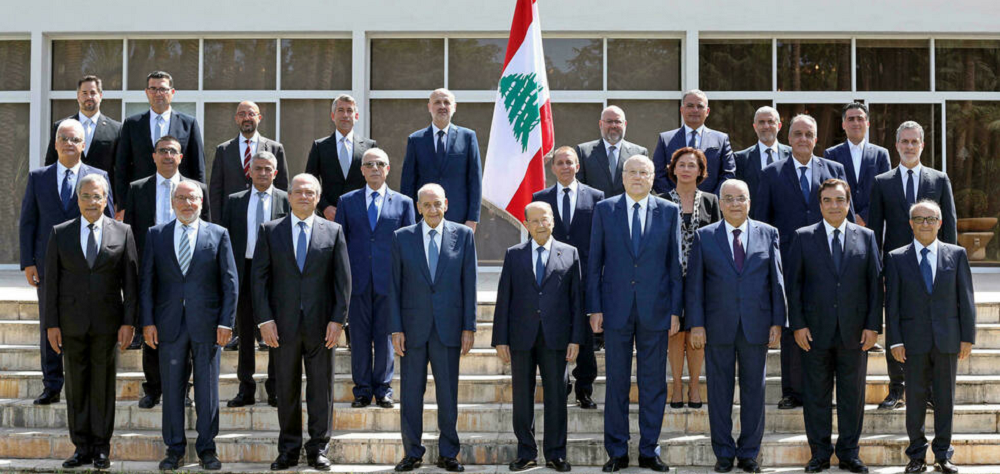AhlulBayt News Agency (ABNA): Najib Mikati finally managed to form new government in Lebanon, ending 13 months of political limbo in the crisis-hit country.
Mikati is the third man tasked with forming a cabinet since the previous government resigned following huge blasts that fully demolished the port of Beirut and part of the capital last summer, killing 214.
The 24-member cabinet should prepare for strenuous tasks including implementation of the reforms asked for by the international community to allow Beirut receive the financial aids.
Power sharing in the cabinet
Mikati's third cabinet is made up of 12 Muslims and 12 Christians, based on the formula for the equal division of posts between the three main factions of power. Hezbollah and Amal movement have received a total of six ministries, equally divided between them. Hezbollah is given utility, transport, and agriculture ministries. Utility ministry is important for Hezbollah because it will be the main government body tasked will reconstruction of Beirut port.
Saad Hariri refused to give Hezbollah the utility ministry until he resigned as PM-designate in July, citing US sanctions and opposition from Persian Gulf Arab investors.
The utility minister Ali Hamieh is a 44-year-old technocrat, a cyber security scientist graduated from a French university.
The ministries of public works, finance, and culture were given to Amal movement. The finance ministry is traditionally held by the movement. Yousef Khalil is picked for the ministry.
The weight of the two movements, known as "resistance", gives the two Shiites the power to, if needed, veto any decisions taken by the government.
PM Mikati gave the ministries of intelligence and communications to the Christian movement Marada, one of the members of the Hezbollah-led March 8 Alliance.
Marada strongly supports relations with the Syrian government and is thus backed by Hezbollah. This makes the members of the government who support partnership with neighboring Syria 15 out of total 33. This government is the biggest supporter of Syrian government coming to power since the assassination of PM Rafik Hariri in 2005.
One of the sensitive and controversial posts, namely interior ministry, that was a sticking point in the government formation was given to a Saad Hariri ally. Michel Aoun believed that, according to the French President Emmanuel Macron's initiative, this post should not be given to the Hariri-led Future Movement, but Hariri strongly wanted to retain the post and even offered Aoun picking a Christian figure from the Future Movement. But Aoun rejected the proposal. The post is now given to Bassam Malawi, a former judge in Beirut and the north.
Hariri party also was given the ministry of health, a post held by Hezbollah in the past two cabinets.
Aoun insisted that the post of foreign minister should be the share of him and his son-in-law and ally Gebran Bassil from the Free Patriotic Union (FPU). However, they finally agreed on Abdullah Bou Habib, the country’s former envoy to the UN from 1983 to 1990. He is a member of the FUP.
Aoun pushed for key posts of defense minister, too, but made a compromise finally. He still has important ministries like energy, tourism, social affairs, and justice. His parliamentary bloc with 29 seats is the largest force in the parliament.
The ministry of energy is an important victory for the FPU, which Aoun and Basil fought hard for. Lebanon is currently in UN-sponsored negotiations with the Israeli regime to draw sea borders. Once the talks are concluded, the country can explore gas, which will possibly turn into its key source of income. If the exploration is conducted, the energy ministry will play a leading role in management of the budget.
The justice ministry is also important with regard to party disputes about the investigation into the destructive port explosions in August 2020.
Mikati's tough path
The new government is being formed as Lebanon grapples with what the World Bank has described as one of the worst economic crises in the world since the 1850s. The vast majority of Lebanese is struggling to make ends meet amid high inflation, fuel and medicine shortages, and round-the-clock power outages. A large part of the population is in poverty, while thousands have left the country. These crises show the uneasy path of the new government to advance the goals and programs with less troubles and to improve the situation according to the will of the people.
In a Friday speech, Mikati said he will do his best to save the country "and stop the country's collapse."
In an interview with the Kuwaiti newspaper Al-Jarida, he said he formed "a team not a government in traditional sense. The team has specific tasks to realize a comprehensive reform plan meant to save Lebanon from the present crises."
He also stressed that since the government's formation, he began contacts with Arab countries to reactivate support efforts for Lebanon. The Arab League yesterday welcomed the formation of a new Lebanese government, but Saudi Arabia, as a foreign actor opposed to Hezbollah role in the government, has not yet reacted, possibly signaling it is dissatisfied with the developments.
It is too early to see if the new government can weather the vast problems the country is dealing with, and Mikati knows he does not have much time.
/129

